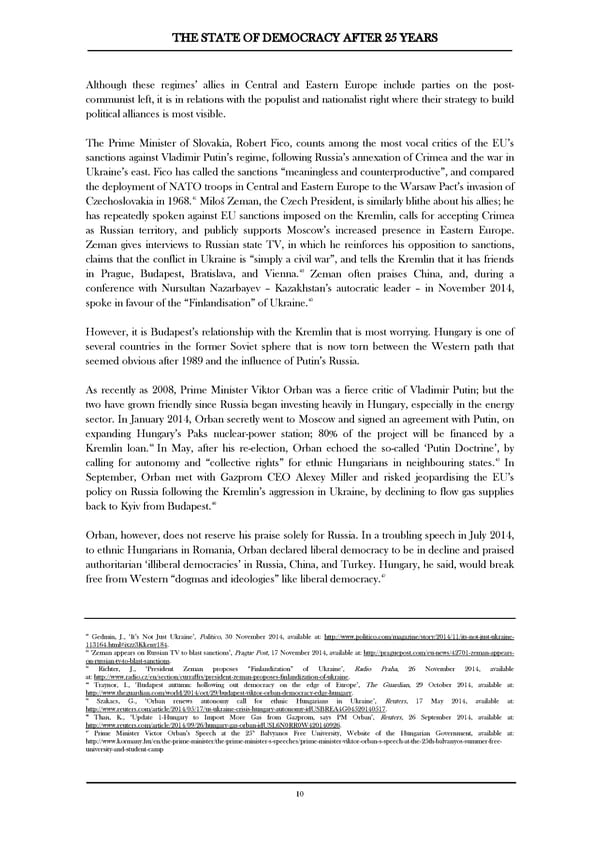THE STATE OF DEMOCRACY AFTER 25 YEARS Although these regimes’ allies in Central and Eastern Europe include parties on the post- communist left, it is in relations with the populist and nationalist right where their strategy to build political alliances is most visible. The Prime Minister of Slovakia, Robert Fico, counts among the most vocal critics of the EU’s sanctions against Vladimir Putin’s regime, following Russia’s annexation of Crimea and the war in Ukraine’s east. Fico has called the sanctions “meaningless and counterproductive”, and compared the deployment of NATO troops in Central and Eastern Europe to the Warsaw Pact’s invasion of 41 Czechoslovakia in 1968. Miloš Zeman, the Czech President, is similarly blithe about his allies; he has repeatedly spoken against EU sanctions imposed on the Kremlin, calls for accepting Crimea as Russian territory, and publicly supports Moscow’s increased presence in Eastern Europe. Zeman gives interviews to Russian state TV, in which he reinforces his opposition to sanctions, claims that the conflict in Ukraine is “simply a civil war”, and tells the Kremlin that it has friends in Prague, Budapest, Bratislava, and Vienna.42 Zeman often praises China, and, during a conference with Nursultan Nazarbayev – Kazakhstan’s autocratic leader – in November 2014, spoke in favour of the “Finlandisation” of Ukraine.43 However, it is Budapest’s relationship with the Kremlin that is most worrying. Hungary is one of several countries in the former Soviet sphere that is now torn between the Western path that seemed obvious after 1989 and the influence of Putin’s Russia. As recently as 2008, Prime Minister Viktor Orban was a fierce critic of Vladimir Putin; but the two have grown friendly since Russia began investing heavily in Hungary, especially in the energy sector. In January 2014, Orban secretly went to Moscow and signed an agreement with Putin, on expanding Hungary’s Paks nuclear-power station; 80% of the project will be financed by a Kremlin loan.44 In May, after his re-election, Orban echoed the so-called ‘Putin Doctrine’, by calling for autonomy and “collective rights” for ethnic Hungarians in neighbouring states.45 In September, Orban met with Gazprom CEO Alexey Miller and risked jeopardising the EU’s policy on Russia following the Kremlin’s aggression in Ukraine, by declining to flow gas supplies back to Kyiv from Budapest.46 Orban, however, does not reserve his praise solely for Russia. In a troubling speech in July 2014, to ethnic Hungarians in Romania, Orban declared liberal democracy to be in decline and praised authoritarian ‘illiberal democracies’ in Russia, China, and Turkey. Hungary, he said, would break free from Western “dogmas and ideologies” like liberal democracy.47 41 Gedmin, J., ‘It’s Not Just Ukraine’, Politico, 30 November 2014, available at: http://www.politico.com/magazine/story/2014/11/its-not-just-ukraine- 113164.html#ixzz3Kkeny184. 42 ‘Zeman appears on Russian TV to blast sanctions’, Prague Post, 17 November 2014, available at: http://praguepost.com/eu-news/42701-zeman-appears- on-russian-tv-to-blast-sanctions. 43 Richter, J., ‘President Zeman proposes “Finlandization” of Ukraine’, Radio Praha, 26 November 2014, available at: http://www.radio.cz/en/section/curraffrs/president-zeman-proposes-finlandization-of-ukraine. 44 Traynor, I., ‘Budapest autumn: hollowing out democracy on the edge of Europe’, The Guardian, 29 October 2014, available at: http://www.theguardian.com/world/2014/oct/29/budapest-viktor-orban-democracy-edge-hungary. 45 Szakacs, G., ‘Orban renews autonomy call for ethnic Hungarians in Ukraine’, Reuters, 17 May 2014, available at: http://www.reuters.com/article/2014/05/17/us-ukraine-crisis-hungary-autonomy-idUSBREA4G04520140517. 46 Than, K., ‘Update 1-Hungary to Import More Gas from Gazprom, says PM Orban’, Reuters, 26 September 2014, available at: http://www.reuters.com/article/2014/09/26/hungary-gas-orban-idUSL6N0RR0W420140926. 47 Prime Minister Victor Orban’s Speech at the 25th Balvyanos Free University, Website of the Hungarian Government, available at: http://www.kormany.hu/en/the-prime-minister/the-prime-minister-s-speeches/prime-minister-viktor-orban-s-speech-at-the-25th-balvanyos-summer-free- university-and-student-camp 10
 The State of Democracy After 25 Years Page 10 Page 12
The State of Democracy After 25 Years Page 10 Page 12